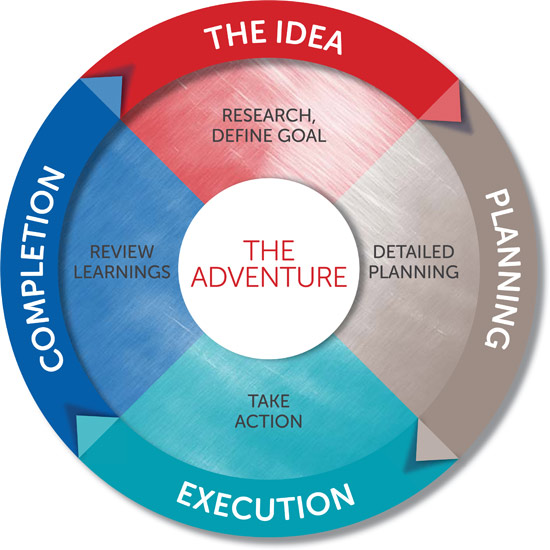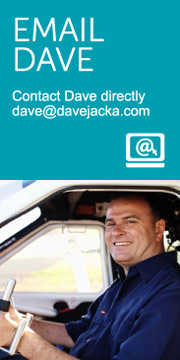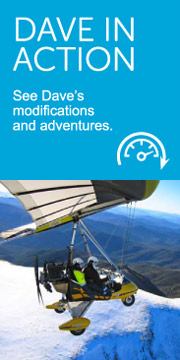Adventure Planning
Dave loves an adventure. Being a trained Project Manager, he enjoys the process of developing the adventure – from the initial concept to exploring & gathering information through to execution.
Dave is available to assist and give guidance in the process of planning an adventure. Contact Dave directly at dave@davejacka.com.
The Adventure Process
Anyone can have an adventure! An adventure can be anything that makes you step outside your comfort zone – even just a little. This will vary from person-to-person as each person’s comfort zone is unique for them.
An adventure may be spontaneous or well-planned. It’s up to you!
You may be young, old, able, disabled, motivated, lazy, feeling brave or scared to try something new. All you need is a simple idea and the desire to have a go.
It can be planned on the back of a napkin at the pub or with as much detail as you feel necessary, but most of all – it must be fun.
All adventures follow a simple, structured four-step process:
The Idea
Planning
Execution
Completion
The Idea
The Idea phase is when you define what your idea or adventure is.
What do you want it to be? This is a high level plan establishing what the adventure could be and how it could be achieved. It typically includes:
- Research – Talking to people, research on the internet; get an idea of what you want to do.
- Scope – How big will it be? How long will it take? It could be a day, weekend or months!
- Resources – What resources will you need? Other participants, support crew, team mate or alone?
- Equipment – What is the main equipment you will need? If you don’t have much money, go cheap – maybe you can borrow, hire or buy second hand!
- Timeframe – Develop a basic timeline with the key milestones – plan out the estimated timeframes from now to the planning and completion phase of the adventure. This will change but most importantly – pick a date to start! It’s essential that you have goals with dates to achieve them.
- Costs – Develop a basic cost estimate that includes anticipated costs from the start of the planning to the completion of the adventure.
- Risks and issues – Identify what the key risks and issues could be and how these could be overcome. Are there any show stoppers?
- Write down “What success looks like?” – If you pull off this adventure and it was a huge success, what would that be like? Try to be as clear as possible.
- Finalise the scope – Plan the specifics of the adventure, the route, transport etc. Do you want to learn anything?
- Finalise the equipment – What is the bare minimum of equipment required? Do you need to modify equipment to suit your needs?
- Develop the schedule – Plan the tasks and milestones required leading up to the adventure and completion.
- Create the budget – Determine the actual costs required, what may be provided as sponsorship or free of charge.
- Select the team – Identify the skills and types of people required if you need a team. This may include team mates or support personnel. Will you lead them?
- Develop a risk management plan – determine what the risks are and how you will manage them. This will depend upon what your risk appetite is.
- Prepare a communication plan – develop a basic plan as to how you will record the adventure – will it be by photos, blog, facebook. Who will you share it with? Do you need to promote the adventure for sponsorship?
You will now be in a position to decide if it’s the adventure you want or whether it needs to be refined to make it what you want. Remember, with adventures, the more they make us step outside our comfort zones, the more rewarding they are!
Planning
This phase is undertaking the detailed planning of all aspects of the adventure.
This may involve the following tasks:
You also need flexibility in your adventure, because unexpected things are guaranteed to happen, whether its delays or anything else that makes you change your plans. Don’t over plan!
Execution
This phase is all about putting your plan into action and getting out and doing it!
If you have other team members involved, you may need to lead the team or it may be a collaborative approach.
Communicate your daily experiences to the outside world – friends, family, followers. If it’s a personal experience, relish the time you have while the rest of the world goes by in their daily grind.
Other risks may become apparent, these need to be assessed and decide if it’s within your’s or the team’s comfort levels.
If the adventure is not working out as planned, be prepared to alter it to get the best outcome. Be Flexible! Modify as you need for safety and ensure the most fun!
Completion
This often neglected phase is about reflecting on the adventure.
Reflecting can help you identify the Learnings.
What went well, what didn’t? Your learnings are a valuable source of information for planning your next adventure or sharing it with others so they can avoid the pitfalls.
Not all adventures come off. At times you may go through all the planning, get to the departure date and never leave due to events outside of your control, missing the window of opportunity.
Your learnings should be fed back into “The Adventure Process”, modifying the adventure so you can have another go or develop a new one.
Most of all “Don’t be discouraged”; this is all part of the Adventure. If it was guaranteed, it wouldn’t be an Adventure!
Success is achieved by those who persist, when everyone else would have given up.
So get out there and have go!



